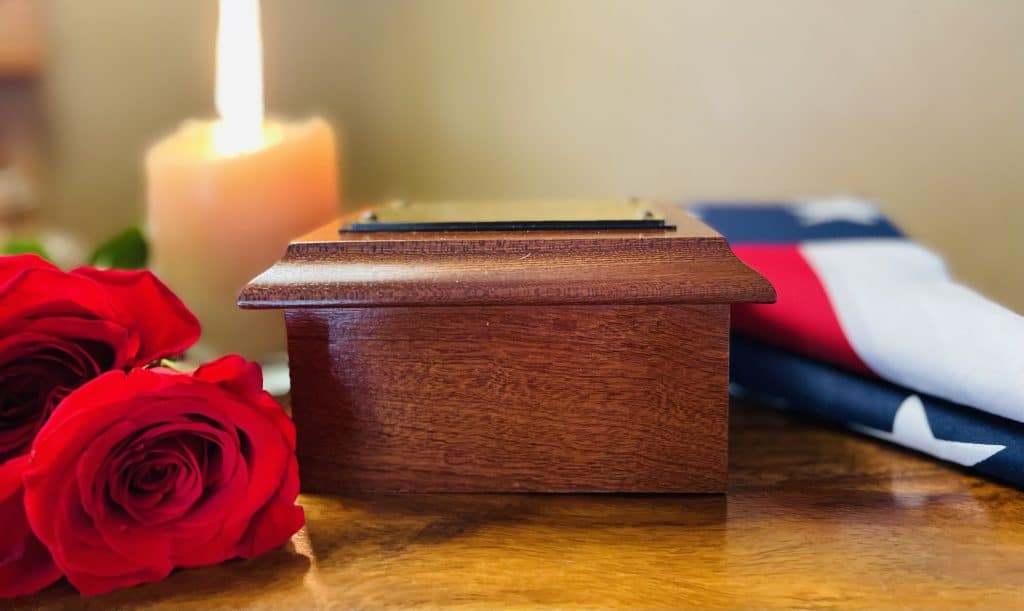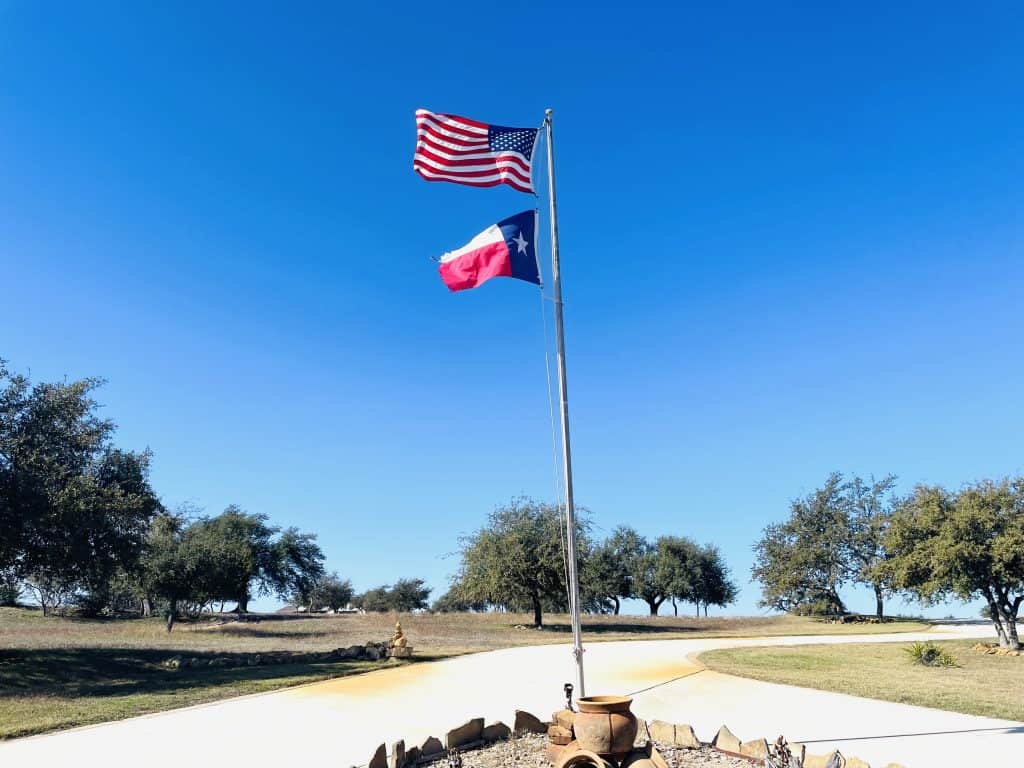This guide aims to answer some key questions about making funeral or cremation arrangements in Texas. We provide an overview of some legal aspects of making funeral plans specific to Texas funeral laws and what funeral or cremation costs to expect.
With the average traditional funeral in Texas costing between $7,000 and $10,000, and that’s before a cemetery plot and grave marker are added to the total bill, it’s not hard to see why more and more families in Texas are considering cremation as an alternative.

Locating Texas funeral homes and cremation Providers
Below, we have listed a selection of average cremation costs by city in Texas and the best direct cremation price for each city. This is to help give you a quick and easy overview of affordable cremation options.
| CITY | AVERAGE PRICE* | BEST PRICE (DFS) | CALL NOW - DFS |
|---|---|---|---|
| AUSTIN | $1,839 | $895 | (512) 253-1110 |
| ABILENE | $3,122 | $1,375 | (325) 246-6878 |
| ARLINGTON | $2,302 | $795 | (817) 369-5240 |
| COLLEGE STATION | $2,289 | $1,595 | (979) 314-3889 |
| DALLAS | $1,994 | $795 | (214) 380-4964 |
| EL PASO | $1,520 | $1,450 | (915) 201-2446 |
| FORT WORTH | $1,632 | $795 | (817) 369-5240 |
| HOUSTON | $2,094 | $795 | (713) 309-6059 |
| EAST TEXAS - Tyler | $2,433 | $995 | (903) 231-9833 |
| PLANO | $1,922 | $795 | (972) 332-0414 |
| SAN ANTONIO | $1,883 | $895 | (210) 460-1911 |
| WACO | $1,350 | $795 | (254) 221-6609 |
To find affordable cremation services in all other areas in Texas, visit DFS Memorials Texas. Visit our Funeral Homes section to find listings for all funeral homes by city.
Direct Cremation is the least expensive type of cremation. However, you may find some funeral homes reluctant to want to talk about this as an option, and often the funeral directors will want to discuss other products and services available, as extras. With a direct cremation, the funeral director chosen is responsible for:
- collecting the body from the place of death
- storage of the deceased prior to the cremation
- filing the legal paperwork
- taking the body to the crematory for cremation
- returning the ashes to family or next of kin
What to do when a death occurs

It can be very daunting to know what to do first when a death occurs. When a death occurs in Texas, the determination of death must be made by a coroner, Justice of the Peace, or attending physician.
If the deceased had a prepaid funeral plan or had expressed wishes, these can be implemented immediately. You will need to locate the paperwork and contact the appropriate funeral home or cremation provider.
If the death is sudden and/or the deceased had no funeral plan or life insurance, you may need to make some rather quick decisions about how to proceed.
Understanding funeral costs in Texas

Funeral homes are required to provide current retail price information by telephone. According to the law, any consumer entering a funeral home and making inquiries must be presented with a general price list (GPL). This must itemize the costs of funeral services and the merchandise for sale from a funeral director.
We often get asked, ‘What is the cost of a funeral in Texas?’ and this is unfortunately not a straightforward question to answer. Unlike many other trades and professions, average service charges can vary significantly.
The NFDA estimates the national average funeral cost of $7,848. However, this does not take into account any cemetery fees. It would be fair to say that the average traditional funeral in Texas can cost around $10,000.
In recent years, there has been a greater demand for alternative, and indeed more affordable, funerals. Interest in cremation services in Texas has increased because they offer a cheaper option than a traditional burial service.
The cost of a cremation in Texas can be under $1,000, so a meaningful and affordable funeral can be achieved for a tenth of the cost of an elaborate traditional funeral service.
Choosing a Cremation Service in Texas

When choosing a cremation service option in Texas, there are several things you should consider. Here are some of the key factors:
Reputation and Experience: If you do not have a trusted funeral service provider, you may wish to research the reputation and experience of a cremation service provider. Look for licensed and reputable funeral homes or cremation providers with a track record of delivering quality services.
What Cremation Services are Offered: Consider the range of services the cremation service provider offers. Some may offer direct cremation, while others may provide additional options like memorial services, viewing arrangements, or assistance with scattering ashes.
The Costs Involved: If you have a budget to manage, you may want to compare the costs of different cremation service providers. Finding a provider that offers transparent pricing and fits within your financial means is essential.
The Facilities and Amenities: If you plan to hold a memorial service or gathering, consider the facilities and amenities offered by the cremation service provider. Ensure they have a suitable space to accommodate your needs. If you are opting for a direct cremation, simple arrangements and the best cost may be your criteria.

Support and Compassion: Choose a service provider that demonstrates empathy, support, and compassion. It’s crucial to feel comfortable and confident in their ability to handle your needs during this emotional time.
Availability and Timeliness of Services: Consider the availability and responsiveness of the cremation service provider. Ensure they can accommodate your desired timeline and promptly address any concerns or questions you may have.
Preplanning and Prepayment Options: Some providers offer preplanning and prepayment options, allowing you to make arrangements in advance. This can help alleviate the burden on your loved ones and potentially save money.
Considering these factors will help you make an informed decision and choose a cremation service option in Texas that best meets your needs and preferences.
Read on to learn more about different cremation options, including direct cremation, cremation with a memorial, and full-service cremation.
Texas Cremation Authorization legislation – Requirements & Process for Cremation

Texas law prohibits cremating any dead human body within 48 hours after death. A body cannot be cremated immediately following death without a waiver. Only the County Medical Examiner or a Justice of the Peace may waive this time requirement.
Cremation is such a complete and final disposition of human remains that a mandatory wait period enables the family and the authorities to be clear that cremation is their choice.
After the mandatory waiting period, cremation can be performed. All the legal next of kin must sign a Cremation Authorization Form and a cremation permit will be issued. In the case of siblings, all must sign to authorize a cremation. Cremation may be prohibited or delayed if there is any disagreement or issue obtaining all signatures.
Visit our article on Cremation Laws and How they Affect Cremation Arrangements.
Texas Cremation Services with a Memorial

A cremation service with a memorial is not much different from a burial service. Only the deceased is cremated instead of buried. There are various options for conducting a cremation funeral in Texas.
You can hold a funeral service with the deceased present prior to cremation or conduct the cremation and hold a memorial with the ashes present or not present.
Today, we are embracing more novel and alternative memorialization ceremonies. Life celebrations can even be held in locations other than places of worship. Celebrants, as well as traditional clergy and ministers, are leading and officiating at memorial services.
Texas direct cremation service providers – cremation costs & packages
Check out this Guide to Cremation Costs in Texas to learn more about prices and providers near you.

Direct cremation in Texas is growing in popularity. A direct cremation means that an immediate cremation is conducted with no service or minimal services and no intervention by a funeral home.
The deceased is generally collected from the place of death and transferred to the funeral home or crematory. After the 48-hour waiting period passes, the deceased is cremated (most often in a simple cardboard container), and the cremated remains are then returned to the family.
Direct cremation in Texas can generally be obtained in many areas for between the cost of $749 and $995.
In some rural areas, a direct cremation can be much higher than this, but if you shop around and compare cremation prices, you should be able to obtain a low-cost direct cremation in Texas.
If you are concerned about funeral costs, Texas’s DFS Memorials offer low-cost cremation and affordable burial services. All DFS Memorials providers guarantee to offer a ‘best value’ direct cremation package.
Texas Funeral legislation – laws governing home death care, embalming & Texas casket sales

A family can bury its own dead without using a licensed funeral director in Texas. However, a statement of death and a death certificate are legally required. Local ordinances or deed restrictions generally prohibit private burials within city limits. You must check with the State Health Department and local zoning authorities for applicable laws.
Embalming is the use of chemicals, internally and externally, to disinfect and temporarily preserve the body. Texas law does not require embalming. But most carriers will require a body to be embalmed prior to shipping.
The laws of the destination country or state will apply. Because of the rapid deterioration of a body after death, Texas law requires that bodies held for over 24 hours or in transit must be embalmed, refrigerated, or encased in a leak and odor-proof container.
Caskets are not required by law in Texas. However, cemetery or mausoleum restrictions may be regarding caskets and outer burial containers or vaults. The law does not require a casket for cremation, but the crematory usually requires some type of container, such as a cardboard box or canvas pouch.
To learn more about cremation services, the cremation process, secure ID tracking, cremation regulations, and laws, visit our Ultimate Guide to Cremation.
Donating your body to science in Texas – or ‘no cost’ cremation

You may choose to make an anatomical donation to a medical or research institution in Texas. Most major medical colleges accept body donations. Companies in the U.S. manage whole-body donation programs and offer a ‘no-cost’ cremation in Texas.
Be aware that not all donations get accepted at the time of death. So, it is advisable to have a plan for a cremation service provider.
What happens if your loved one dies away from Texas?

Unfortunately, this is happening more and more as Texans travel and as people need to move for employment. Coping with a death is very distressing, but if it has occurred whilst your loved one was away from home, it can be even more difficult.
Shipping a body either domestically or internationally can be inordinately expensive. The typical professional fee for a funeral director to coordinate the collection of the body at the place of death, prepare the body for shipping, and handle all the relevant documentation can cost as much as $3,000, and this does not include the freight charge. For this reason, many chose to cremate at the place of death and have the cremated remains shipped back.
To learn more, visit our section on Funeral Shipping.
If you travel regularly, you may consider purchasing protection against expensive repatriation costs. A Travel Protection Plan is an affordable assurance policy that covers an individual for ALL funeral expenses if they should die while away from their home in Texas.
This plan costs just $450 for a lifetime membership, making it a great peace-of-mind cover to protect your family from stress, cost, and arrangements. One call to the assurance company when a death occurs, and all arrangements are managed for the family. Click on the link below to read more and enroll.
Hispanic Funerals in Texas
Texas has one of the highest concentrations of Hispanic population, mainly immigrants from Mexico. Although many Hispanics and Latinos choose to repatriate remains, the rapidly growing Hispanic-American population also chooses Texas as their final resting place. Therefore, there are a number of dedicated Hispanic funeral homes in Texas.
Visit our Texas Funeral Planning Guide in Spanish if you need the services of a Hispanic Funeral Home. You can find contact details of funeral homes specializing in Hispanic funeral services.
Planning a Green Funeral in Texas
There is growing interest from families in green or natural funeral options. Texas has many rural areas, and traditionally, burial was a preferred option. Although there has been a shift to cremation in recent years, this demand has largely been dictated by its reduced cost and availability.
As we all become more environmentally conscientious and climate change becomes a mainstream agenda and responsibility for us all, some families are looking towards natural or green burial as an alternative (and more affordable) option.
It is possible to arrange a green funeral in Texas for as little as $1,000, although the average cost is nearer to $3,500.
Visit our Guide to Green Burial Services and Cemeteries in Texas to learn more about arranging a green funeral near you.

Texas Funeral Home reviews and or complaints
Our online review-based consumer culture has reached the funeral business, and now you can review and compare funeral homes in Texas online. Directory sites often include local business reviews, which can help you learn about a funeral or cremation provider. As with reviewing any service or product, some common sense and integrity must be employed.
If you have a complaint against a funeral director or a funeral establishment, you should attempt to resolve your complaint directly with the funeral home concerned. You can contact the Texas Funeral Service Commission if you do not reach a satisfactory resolution. A formal complaint against a funeral establishment must be put in writing to them and include copies of all documentation from the funeral home.
Texas Funeral Service Commission
P.O. Box 12217
Capitol Station
Austin Texas 78711
Hopefully, this guide to arranging a funeral or cremation in Texas has answered some of your questions. Please use our funeral resource library to access further articles to assist you with arranging a funeral.
Related Articles:
- Cremations in Dallas-Fort Worth: 5 Tips for arranging an affordable cremation
- Funeral Homes catering to the Hispanic Population
Resources:
DFS Memorials – Save on Cremation Costs in Texas
Guide to Cremation Costs in Texas 2023
Funeral & Cremation Planning Guide – Austin
Funeral & Cremation Planning Guide – Dallas
Funeral & Cremation Planning Guide – Fort Worth
Funeral & Cremation Planning Guide – El Paso
Funeral & Cremation Planning Guide – Houston


